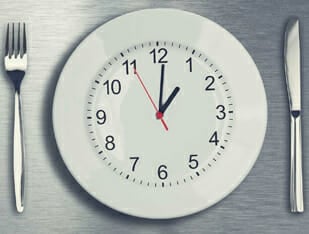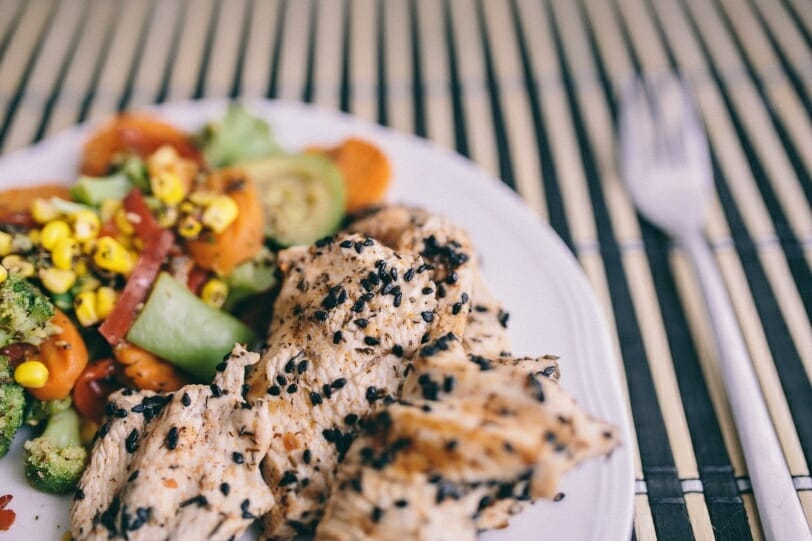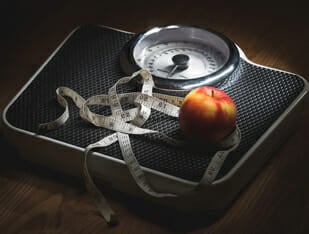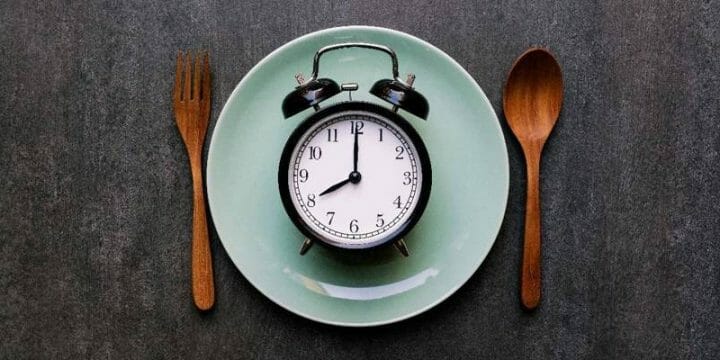Intermittent fasting isn't a diet, as many people think. It is a way of scheduling your meals at specific times. Through this, your body will maximize each nutrient you consume in your diet. Intermittent fasting is gaining popularity across the globe as it helps with weight loss.
Weight gain is linked to eating more calories when compared to the ones getting thrown out of the body. Basically, intermittent fasting doesn't focus on the kinds of meals you consume rather than the time you dine.
This way of eating has also been attributed to reduced inflammation and the effects of chemotherapy. As a health and performance coach, I implemented intermittent fasting for 3 months, and now I am going to share everything I know about it below.
Quick Summary
- Intermittent fasting focuses on meal timing rather than meal content, helping the body maximize nutrient intake and aiding in weight loss by limiting daily calorie intake.
- This method of eating not only aids in weight loss but also contributes to increased endurance, muscle gain, reduced inflammation, and improved mental clarity.
- A 2014 study on the Translational Research website found that intermittent fasting led to a 3%–8% weight loss in participants over several months, with a significant reduction in waist size, indicating a loss of belly fat.
- Through my personal journey with intermittent fasting, I've found its simplicity and effectiveness, exploring methods like 16:8, 24-hour, and alternate-day fasts to suit diverse lifestyles and goals.
What is Intermittent Fasting?

Intermittent fasting is scheduling your meals for specific time intervals so that your body gets the most benefit out of it.
The results of intermittent fasting (IF) for weight loss can be astounding.
This plan isn't focused on which foods you eat (or often, not how much). Rather, it's when you eat that makes all the difference.
These fasts can last anywhere from 16 to 36 hours and are usually repeated several times throughout the week.
The main idea of intermittent fasting is that you undergo a series of short-term fasts to lower the amount of calories you eat in a day while also revving up your metabolism to its full fat-burning potential.
A food fast can be as simple as eating a big dinner and then not consuming anything but tea or coffee until 1 p.m. the next day. Lunch and dinner are then eaten normally after this fasting phase, and the process can be repeated over and over again.
It's an easy diet to stick to because you can start it with minimal preparation, but the results are so effective that they will keep you motivated for the long term.
As an added benefit, following an IF meal plan supplemented with exercise can help you build up your endurance and gain lean muscle mass.
How Does It Work?

It works by alternating between fed and fasted states. This change significantly impacted how my body processed food and burned fat.
Your body acts differently depending on which state it is in.
Fed State - After you eat a big meal, your body is in the fed state for 3 to 5 hours while it digests and absorbs all the nutrients it can get from your food.
This means it won't be turning to its fat stores for energy, especially if you've eaten lots of carbohydrates and starches that raise your insulin level.
It takes our bodies almost 12 hours to enter the fat-burning fasted state.
Fasted state - After your food is digested, your body goes into a post-absorptive state that lasts between 8 and 12 hours after eating. When food is absent, the body's levels of blood glucose go down significantly. This lowers the amount of insulin that is available, which causes your body to burn through its fat reserves for fuel instead.
Working out in a fasting state is especially beneficial for your body. When you exercise at a time when your body can't draw from its glucose stores, it is forced to adapt and use the other source of energy that's available: your body fat.
Reasons to Consider Intermittent Fasting

Maybe you've been trying to lose weight for months without seeing much result.
I remember struggling with weight loss for months until I discovered intermittent fasting. It was a game-changer in my fitness journey, helping me overcome that stubborn weight plateau.
Perhaps the last few pounds are proving to be the most difficult to dislodge. If this sounds like you, your eating habits could benefit from trying intermittent fasting.
Below are some of the reasons why intermittent dieting might be the right diet plan for you.
1. It's Not A Diet, It's A Method Of Eating - Regular diets like Weight Watchers or Atkins can be a pain to live with on a daily basis as you have to count calories and avoid certain foods. While diets like Calisthenics might not count calories, you still need to avoid certain foods. With IF, you just change when you eat, allowing for more flexibility throughout the day. Most diets fail because it is difficult to stick to them in the long term as you have to give up your favorite foods, unlike IF.
2. Your Workouts Might Become More Effective - It may seem counter-intuitive, but working out on an empty stomach may actually make your workouts more effective. Exercising on an empty stomach supercharges your body's fat-burning abilities, allowing you to shed more weight in less time.
3. Your Eating Plans Become Simpler - Intermittent fasting allows you to make big changes to your body's fuel efficiency with only minimal changes in behavior. You will have fewer meals per week to worry about, and you rarely need to calculate what goes into each meal. By eating fewer meals, you'll be doing less cooking and, consequently do less grocery shopping. Saving the time each day that would normally be spent preparing and eating food can add up over time.
4. You Can Stave Off Emotional Eating - If the restrictive nature of most diets causes you to binge on cheat days, IF might be a good diet plan for you. Studies have shown that when people followed an IF diet combined with exercise, they decreased their levels of emotional eating and were less likely to make harmful food choices.
5. You Just Might Live Longer - It's been known for decades that restricting calories can help you live longer, and IF makes eating less easy and painless. It activates the same mechanisms for extending your life as restricting your calories, all without the benefit of feeling like you have to deprive yourself.
You can also watch this interview with Joe Rogan, where they tackle the reasons why you should do intermittent fasting.
Intermittent Fasting Methods

When I first explored intermittent fasting, I was surprised by how straightforward it was to integrate into my daily routine. Simply cut out some of the times that you eat food and experiment until you find what feels right for your body.
Some people do better with a small breakfast at the beginning of the day, while others are able to skip food entirely until the afternoon. The key is to try different methods until you find what your body responds best to.
There are several types of intermittent fasts, all which rely on different intervals of time between eating and fasting. Six of the most popular diet plans are explained below.
1. 16:8 (Lean Gains)

As one of the most popular fasting methods for beginners, the Lean Gains method was created by Martin Berkhan as a way to make fasting both convenient and habitual.
The premise behind this diet plan is simple: dieters don't eat anything for 16 hours and then eat within an eight-hour eating window, sometimes referred to as 16/8 fasting.
Most people eat their last meal of the day around 8 p.m. and then fast through the night and morning until 1 p.m. For maximum fat-burning benefits, some people choose to workout around 11 a.m. or noon.
| ADVANTAGES | DISADVANTAGES |
|
|
2. 24 Hour-Fasts (Eat-Stop-Eat)

The Eat-Stop-Eat fast was created by Brad Pilon and is ideal for healthy eaters looking to get an extra boost out of their diet.
The premise is that followers of the plan go on 24-hour fasts for one or fewer days every week. Some practitioners fast just a few times a month.
Surprisingly enough, even occasional fasts like this have been shown to lead to health benefits.
The idea is that by cutting out a day of eating every once in a while, you will be restricting your overall calorie levels, even if your daily eating habits remain unchanged.
| ADVANTAGES | DISADVANTAGES |
|
|
3. Alternate Day IF (Up Day, Down Day)

Created by Doctor James Johnson, the Up Day Down Day fasting program is all about weight loss and is structured to cause you to lose as much weight as possible in a healthy way.
The idea is that alternating the number of calories you eat every day activates the SIRT1 gene, which helps prevent your body from putting fat into long-term storage.
This meal plan is simple to follow. You alternate each day from eating a normal diet to eating one fifth of the calories you ate the day before. For most men, this means they eat 2,500 and 500 calories every other day, and for women, the levels are 2,000 and 400.
| ADVANTAGES | DISADVANTAGES |
|
|
4. 20:4 (The Warrior Diet)

The Warrior Diet, started by Ori Hofmekler, combines a 20-hour fast with a 4-hour eating window.
The long fast increases the functionality of the sympathetic nervous system (responsible for fight-or-flight tendencies) in order to stimulate lipolysis and increase the metabolic rate of fat burning.
This helps the body to absorb glucose properly and recover more efficiently after a big workout, while also increasing your alertness and boosting your energy levels.
| ADVANTAGES | DISADVANTAGES |
|
|
5. 5:2 Fast

Popularized by the British doctor Michael Mosley, the 5:2 diet allows you to eat normally for five days out of the week and to eat only 500–600 calories on two nonconsecutive days.
There are no eating requirements besides counting calories two days a week, and you have complete control over which days those will be.
Many people choose to fast on Monday and Thursday and eat regularly for the rest of the week.
| ADVANTAGES | DISADVANTAGES |
|
|
6. 36-Hour Fasts (Fat Loss Forever)

By far the most complex plan to follow, Fat Loss Forever starts you off with one cheat day every week, which is followed by a 36-hour fast.
The rest of the week is split into varying intervals of fasting and eating periods.
Romaniello and Go (founders of the diet) recommend that your longest fasts take place on your busiest days and that you keep yourself busy and productive to keep your mind off your hunger.
When combined with strength training, this plan will bring you to your ideal weight in a very efficient way.
| ADVANTAGES | DISADVANTAGES |
|
|
What Are The Benefits?
The benefits are increased weight loss, cancer prevention, and reduced inflammation.
Since I began regulating my eating through intermittent fasting, I've noticed significant improvements in both my physical health and mental clarity. Not only can it cause weight loss, but it can also help protect you against inflammation and cancer.
Increased Weight Loss - A 2014 study on the Translational Research website found that a weekly fasting practice led to 3%–8% weight loss in participants after several months. Those same participants saw their waist size shrink by 4–7%, meaning belly fat was the main type of weight they were losing. The diet was also found to do a good job of lowering insulin levels and improving the body's ability to process insulin quickly [1].
Cancer - One of the studies found on the National Center for Biotechnology Information website revealed that the harmful effects of chemotherapy could be reduced when patients fasted before getting treatment. In contrast, a separate study from the same website found that alternate-day fasting during treatment led to better cure rates for patients [2,3].
Reduced Inflammation - Chronic inflammation is the precursor to a variety of horrible long-term health conditions, like arthritis and heart disease. Thankfully, fasting seems to provide some benefit. Going through periods of fasting can trigger damage-repairing adaptations in your cells, which break down inflammation at its beginning. Numerous studies have shown that regular fasting can reduce the overall amount of inflammation you experience, which helps to lower your risk of developing a disease [4].
Is Intermittent Fasting Safe?
Intermittent fasting is safe.
At this point, you may be thinking that fasting looks like a miracle diet cure for everyone. Though the evidence can be compelling, that's not quite true.

Women - There is some evidence that IF might not be as beneficial for women as it is for men. Some studies have shown that while IF can improve insulin sensitivity levels for men, it can actually have the opposite effect on women and worsen their control of their blood sugar levels [5].
Regular fasting often stops a woman's period, though it usually comes right back when they stop fasting.

Pregnant women - The practice can also be damaging for women who are trying to get pregnant, are already pregnant, or are breastfeeding. If you are female, the best way for you to start intermittent fasting is to ease into it.
Start for a few hours at a time and up the amount weekly if you continue to feel good. If you start to notice negative side effects from fasting, you should stop the practice right away.

Diabetics - There are also medical conditions that can make fasting a bad idea.
If you have diabetes or need to regulate your blood sugar, it's not a good idea to force your body to go for hours without food.
Like most people always say, it's better to be safe than sorry.

History with eating disorders/underweight - If you are prone to eating disorders or are already close to being underweight, fasting won't give you much benefit and might even trigger you to start an eating disorder.
All this to say, intermittent fasting is a safe and effective dieting method for a huge number of people. If you are healthy and well-nourished overall, you shouldn't have any problems.
How to Get Started
Many people start off with the 16:8 method, where you eat within an 8-hour window. It's the simplest and most sustainable way of intermittent fasting.
If this gets too easy you can then move on to 24-hour fasts or other methods mentioned before.
When you first start fasting, it's more than likely you will experience feelings of overwhelming hunger and feel weaker and slower than usual. This is completely normal and part of your body's adjustment period. Your feelings of hunger should fade within a few fasting sessions as you get used to occasional hunger pangs.
For the first few times, you can even have a small snack handy just in case you need to revive yourself.
However, if you feel ill or faint every time you start to fast, something bigger might be going on, and you should grab something to eat and talk to your doctor right away. Fasting isn't for everyone, and some bodies respond differently than others.
Some people truly do need to eat three big meals every day, and that's perfectly fine. The best thing you can do is listen to your body and adjust your fasting plans according to what it responds best to.
Tips for Your First Fast
Ready to give fasting a try?
Here are some tips to keep in mind:
- Drink lots of water: Being dehydrated makes every fast more difficult to get through, so keep a water bottle by your side wherever you go.
- Fast overnight: By keeping your longest fasts during the night, you allow yourself to sleep through eight hours of it, which makes the process much easier mentally.
- Go all in: At least with your schedule, that is. By keeping yourself busy, you don't have time to think about your hunger.
- Go for a workout: Working out during your fast helps you burn fat faster, which makes your fasting plan even more effective for weight loss.
- Start with water and keep on drinking: It makes perfect sense: drink a large glass of water before eating, and you’ll literally become fuller faster. Drink throughout the day as well. Often, dehydration masks itself as hunger when all you really need is some refreshing H2O [6].
What to Eat on an Empty Stomach to Lose Weight?
Foods to eat on an empty stomach to lose weight include high-fiber foods like oatmeal with berries. This will help you eat fewer calories throughout the day.
You may also consider the following options:
-
Herbal Teas - Known for their high polyphenol content, herbal teas aid digestion and metabolism by boosting antioxidant activity [7].
-
Warm water with lemon and honey - It takes only a short stretch of time to make a drink of warm water, lemon, and honey, but it boosts metabolism [8].
-
Aloe vera and lemon mix - Aloe vera contains essential vitamins, minerals, enzymes, and amino acids that can boost your metabolism and increase your energy [9].
- Raw vegetable juice - Celery, beets, and leafy greens are known not only for their healing properties but also for their ability to aid weight loss [10].
- Apple cider vinegar - Several studies have found that taking apple cider vinegar (ACV) before meals boosts metabolism, burns stubborn fat, and prevents fat buildup by increasing the digestive juices in the stomach [11].
FAQs
What Happens if I Train on a Fast?
If you train on a fast, you can increase fat burn, with studies indicating up to 20% more fat burned during exercise. Intermittent fasting can enhance exercise and strength training by boosting metabolic efficiency and promoting a higher anabolic response post-workout.
Does Intermittent Fasting Break Down Muscle?
No, intermittent fasting doesn't break down muscle. The human body is an expert at preserving muscle mass, while fasting and protein absorption take hours to complete. Though muscle loss will eventually start to occur from fasting, it won't start until you have been doing it for 72-96 hours, far longer than most people want to give up food.
Can I Take Supplements While Fasting?
Yes, you can take supplements while fasting. Pay attention to whether your supplements can be taken on an empty stomach. Most vitamins are recommended to be eaten with food, because the side effects of eating them on an empty stomach include nausea, diarrhea and stomach pain.
Related Post: Should you take BCAAs while fasting?
How Many Hours Is Considered an Empty Stomach?
Three to four hours is considered an empty stomach. This time frame allows for the stomach to empty its contents into the small intestine, typically marking the point at which the stomach is empty and ready for a new meal or medication.
What Is Portion Control Dieting?
Portion control dieting is controlling how much you eat for meals and snacks (and don’t forget those pesky liquid calories). If you want to stay in shape or lose weight, you’ve got to burn more calories than you consume.
How Does Intermittent Fasting Affect Mental Health?
Intermittent fasting positively affects mental health by stabilizing mood and improving cognitive functions. It may also reduce stress and anxiety levels by regulating hormones that affect mental well-being.
What Is the Relationship Between Intermittent Fasting and Gut Health?
The relationship between intermittent fasting and gut health is the promotion of gut bacteria diversity and the improvement of overall digestive function. This fasting method helps in resetting the gut microbiota, which plays a crucial role in nutrient absorption and immune response.
How Does Intermittent Fasting Influence Hormonal Responses?
Intermittent fasting influences hormonal responses by affecting key hormones like insulin, reducing insulin resistance, and balancing ghrelin and leptin, which control hunger and satiety. These hormonal changes contribute to better metabolic health and can aid in effective weight management.
Can Intermittent Fasting Contribute to Increased Longevity?
Research suggests that intermittent fasting may contribute to increased longevity and improved aging processes. This is attributed to enhanced cellular repair mechanisms and reduced oxidative stress during fasting periods.
How Can One Customize an Intermittent Fasting Plan?
One can customize an intermittent fasting plan by adjusting fasting periods and eating windows to fit individual lifestyles, health conditions, and fitness goals. Personalization is key, as it ensures the fasting regimen is sustainable and effective for each individual's unique needs.
References
- Adrienne R. Barnosky, Intermittent fasting vs daily calorie restriction for type 2 diabetes prevention: a review of human findings. Retrieved from https://www.translationalres.com/article/S1931-5244(14)00200-X/abstract
- Fernando M. Safdie, Fasting and cancer treatment in humans: A case series report. Retrieved from https://www.ncbi.nlm.nih.gov/pmc/articles/PMC2815756/
- Johnson JB, Pretreatment with alternate day modified fast will permit higher dose and frequency of cancer chemotherapy and better cure rates. Retrieved from https://pubmed.ncbi.nlm.nih.gov/19135806/
- Faris MA, intermittent fasting during Ramadan attenuates proinflammatory cytokines and immune cells in healthy subjects. Retrieved from https://pubmed.ncbi.nlm.nih.gov/23244540/
- Heilbronn LK, Glucose tolerance and skeletal muscle gene expression in response to alternate day fasting. Retrieved from https://pubmed.ncbi.nlm.nih.gov/15833943/
- Sarah-Jane Bedwell, 3 Reasons Why You Should Drink a Glass of Water Before Each Meal. Retrieved from https://www.self.com/story/3-reasons-to-drink-water-before-each-meal
- Caibi Zhou, Review on the Weight-Loss Effects of Oxidized Tea Polyphenols. Retrieved from https://www.ncbi.nlm.nih.gov/pmc/articles/PMC6099746/
- Sowmya Binu, 6 Reasons Why You Should Drink Lemon And Honey Water. Retrieved from https://www.netmeds.com/health-library/post/6-reasons-why-you-should-drink-lemon-and-honey-water
- Amar Surjushe Aloe Vera: A Short Review. Retrieved from https://www.ncbi.nlm.nih.gov/pmc/articles/PMC2763764/
-
- Tomoo Kondo, Acetic acid upregulates the expression of genes for fatty acid oxidation enzymes in liver to suppress body fat accumulation. Retrieved from https://pubmed.ncbi.nlm.nih.gov/19469536/
About The Author
You May Also Like







I am definitely going to start the intermittent diet. I will send my before and after pictures.
Thanks for this. Since the benefits of intermittent fasting look promising, I’ll try this out. I hope it will make me lose weight fast!
I tried the 5:2 diet for a week and thought I was going to starve on the fasting days, but I survived. Now it feels like a routine. It’s like fasting gives me a weird sense of accomplishment.
The tip about drinking water during fasting was such a lifesaver. I’ve just started fasting, and I swear half the time I think I’m starving when I’m really just thirsty—it’s like my body is playing tricks on me. Does anyone have tips for staying hydrated without turning into a human water balloon? Asking for a friend?
This article confirmed so many benefits I’ve noticed since starting intermittent fasting, especially the clearer focus and energy during the day. I never thought skipping meals could feel so liberating.
The focus on how intermittent fasting might support longevity was fascinating. Who wouldn’t want to live a longer, healthier life by just tweaking when they eat?
The Warrior Diet sounds intense. For those who’ve tried it, how do you manage hunger with only one main meal a day?
This guide cleared up a lot of questions I had about intermittent fasting, so, thank you James. Now I’m trying to decide on the best starting method. Do you think the 5:2 approach, with two low-calorie days a week, is a good entry point, or would it be easier to start with the 16:8 method and gradually build up? For anyone who’s tried both, how did they compare in terms of results and ease of sticking with it?
Wow, I didn’t realize you could still gain muscle while fasting. I’ve always worried it might break down muscle instead. Does anyone here combine fasting with strength training? How does it feel during workouts?
This article convinced me to give intermittent fasting a try. I love the simplicity of focusing on meal timing instead of restricting specific foods. Quick question—has anyone else felt lightheaded or low on energy during the first few days? I’m wondering if this is just an adjustment phase or if there are any tips to make the transition smoother.
Thank you for pointing out that intermittent fasting isn’t ideal for everyone, especially for women and people with certain conditions. It’s good to see a balanced perspective.
I found the part about fasting reducing inflammation fascinating. I’ve been dealing with arthritis and wonder if fasting could help.
I appreciate the information on fasting for women! Does anyone have tips for making intermittent fasting work with hormonal fluctuations?
Intermittent fasting sounds great, but I’m worried about how it will affect my muscle gain. I’ve always been told eating more frequently is important for building muscle, not sure if this will work for me.
Intermittent fasting seems like a solid approach for weight management, but I wonder how sustainable it is long-term. The breakdown of different fasting windows here is helpful for finding what works bes
Intermittent fasting works for a lot of people, but it’s important to choose a fasting method that suits your lifestyle. The breakdown of different windows and their benefits in this article makes it easier to find the best approach for your fitness goals.